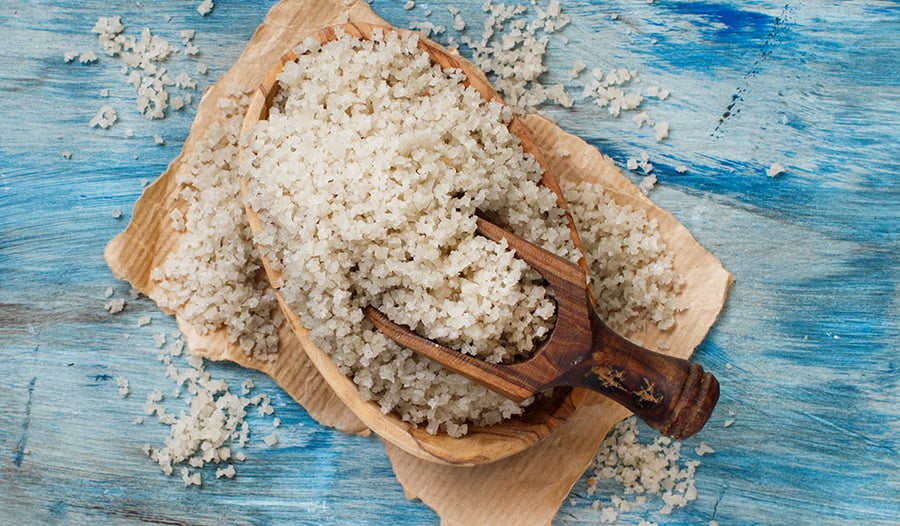Keltisk havsalt: Helsefordeler, hva som gjør det annerledes, + mer

Du har sikkert sett keltisk salt overalt i sosiale medier, lovprist for sitt mineralinnhold og sine helsefordeler. Men hva er det egentlig, og lever det opp til hypen?
Viktige læringspunkter
- Keltisk salt er et uraffinert havsalt som høstes fra kystområdene i Frankrike. Den grå fargen kommer fra de leirkledde saltlagene, som beriker den med mineraler.
- Sammenlignet med bordsalt er det mindre bearbeidet, inneholder flere spormineraler (som magnesium og kalium) og har et litt lavere natriuminnhold.
- De viktigste fordelene er knyttet til den rike mineralprofilen, som kan støtte hydrering, elektrolyttbalanse og fordøyelse.
- Selv om keltisk salt inneholder flere mineraler, er det likevel en form for natrium og bør inntas med måte som en del av et balansert kosthold.
Keltisk salt vs. Himalayasalt vs. Bordsalt
Keltisk | Himalaya | Tabell | |
|---|---|---|---|
Opprinnelse | Frankrikes kyst | Pakistan | Saltgruver |
Farge | Lys grå | Rosa | Hvit |
Tekstur | Fuktig, grov | Tørr, grov | Fin |
Behandling | Uraffinert, soltørket | Uraffinert, utvunnet | Raffinert, bleket |
Nøkkelmineraler | Magnesium, kalium | Jern, kalsium | Natriumklorid |
Hva er keltisk havsalt?
Keltisk havsalt, også kjent som sel gris eller gråsalt, er et håndhøstet og soltørket salt som bevarer det naturlige mineralinnholdet og den karakteristiske smaksprofilen. Den unike produksjonsmetoden skiller det fra andre salter, noe som gjør det til et populært valg blant kokker, ernæringseksperter og helseentusiaster.
Keltisk havsalt har en historie som går flere hundre år tilbake i tid. Dens røtter kan spores tilbake til det keltiske folket, som levde i kystområdene i Bretagne i Frankrike. Disse gamle samfunnene høstet salt ved hjelp av tradisjonelle metoder, der de utnyttet solens og vindens kraft til å fordampe sjøvann og utvinne salt i sin reneste form.
Nøkkelegenskaper ved keltisk havsalt
Keltisk havsalt skiller seg ut med sine særegne egenskaper som gjør det til en ettertraktet ingrediens i kjøkken verden over. Her er noen av de viktigste egenskapene som skiller keltisk havsalt fra andre.
Mineralrikdom
Keltisk havsalt har blitt stadig mer populært på grunn av sitt betydelige mineralinnhold. I motsetning til bearbeidet bordsalt, bevarer keltisk havsalt essensielle spormineraler som magnesium , kalium og , kalium , kalsium og jern . . Disse mineralene gir ikke bare saltet en særegen smak, men har også potensielle helsefordeler.
Tekstur og fuktighet
Keltisk havsalt har en grov tekstur og holder på litt fuktighet, noe som gir det en herlig knasende smak når du spiser det. Denne konsistensen gjør det til et ideelt valg som avslutningssalt, ettersom det tilfører smak og tekstur til retter rett før servering. I tillegg gjør fuktighetsinnholdet i keltisk havsalt at det absorberer fuktighet fra omgivelsene, slik at det ikke blir for tørt eller klumper seg sammen.
Naturlige farger
Saltets grålige farge, ofte omtalt som gråsalt, skyldes mineraler og sporstoffer som finnes i miljøet der det høstes. Tilstedeværelsen av disse naturlige fargene er et visuelt bevis på saltets uraffinerte natur og anses ofte som en indikator på dets høye kvalitet og renhet.
Helsemessige fordeler av keltisk salt
I tillegg til å tilføre smak til retter, antas det å ha potensielle helsefordeler på grunn av sin mineralrike sammensetning. Selv om forskningen på keltisk havsalt fortsatt pågår, er det noen fordeler med å innlemme keltisk havsalt i kostholdet.
1. Essensielle mineraler i keltisk havsalt
Keltisk havsalt fremstår som et kulinarisk og helsemessig vidunder, kjennetegnet av et imponerende utvalg av over 60 essensielle mineraler - langt fra det gjennomsnittlige bordsaltet. Det er en skattkiste av viktige næringsstoffer, som et naturlig multivitamin som kan forvandle hver eneste klype til et skritt mot en sunnere kropp.
Forestill deg dette: Med hvert dryss keltisk havsalt tilfører du måltidene dine de fordelene med magnesium , en nøkkelfaktor for muskelfunksjon og kalsium som er viktig for å styrke skjelettet. som er viktig for muskelfunksjonen, kalium som fremmer hjertehelsen, og kalsium, som er avgjørende for å styrke skjelettet. I en verden der disse mineralene ofte mangler i vårt daglige kosthold, blir keltisk havsalt mer enn et krydder; det blir en enkel og deilig metode for å fylle på med viktige næringsstoffer.
2. Opprettholdelse av elektrolyttbalansen: En naturlig alliert for hydrering
Keltisk havsalt står i sentrum som en naturlig alliert for å opprettholde den delikate balansen mellom elektrolytter, en grunnleggende faktor for å holde seg hydrert og sikre god muskelfunksjon. en grunnleggende faktor for å holde seg hydrert og sikre smidig muskelfunksjon. Etter trening er det avgjørende å fylle på med tapte elektrolytter, og keltisk salt er et sunnere alternativ til bearbeidede sportsdrikker.
Ved naturlig å gjenopprette vitale mineraler som natrium, kaliumog magnesiumblir keltisk havsalt et must-have for treningsentusiaster og alle som ønsker å støtte kroppens naturlige balanse. Bare en klype i drikken eller måltidet etter trening kan utgjøre en betydelig forskjell i hvordan du restituerer deg, noe som understreker dens allsidighet som et holistisk hjelpemiddel for velvære.
3. Støtter fordøyelseshelsen: Mer enn bare et krydder
I tillegg til sine kulinariske egenskaper er keltisk havsalt også en venn av fordøyelsessystemet. Den er rik på mineraler og bidrar til produksjonen av fordøyelsesenzymer - en viktig komponent for effektiv nedbrytning av maten. Dette sikrer ikke bare et bedre næringsopptak, men bidrar også til en smidigere fordøyelsesprosess og kan lindre oppblåsthet og ubehag.
Å inkludere keltisk havsalt i kostholdet ditt kan være en enkel, men effektiv måte å støtte fordøyelseshelsen og det generelle velværet på, samtidig som det gjør måltidene dine mer smakfulle.
4. Naturlig smaksforbedring: En game-changer for smaksløkene dine
Keltisk havsalt er mer enn bare et krydder; det er en game-changer for smaksløkene dine. Den unike og subtile smaken gjør mer enn bare å salte rettene dine - den fremhever de naturlige smakene uten å overdøve dem. Både kokker og hjemmekokker lovpriser keltisk havsalt for dets evne til å få frem det beste i ingrediensene, enten det er i en salat, på grillet kjøtt eller i en kraftig gryterett. Det kan være et flott supplement til andre urter og krydder.
Å bytte til keltisk havsalt er en enkel, men transformerende måte å forbedre matlagingen på, og sikrer at rettene dine ikke bare blir sunnere, men også mer velsmakende, takket være tilsetningen av et rent, uraffinert preg.
5. Redusert inntak av natrium
Selv om keltisk salt fortsatt er en kilde til natrium, gir mineralsammensetningen en mer nyansert og smakfull smak, noe som potensielt kan redusere mengden som trengs sammenlignet med høyprosessert bordsalt. Dette aspektet gjør den til et foretrukket valg for dem som ønsker å moderere natriuminntaket uten å gå på kompromiss med smaken.
6. Fremme bedre hydrering: Utover vannets essens
Selv om vi vet at vann spiller en viktig rolle i livet vårt, tilfører keltisk havsalt en ny dimensjon til begrepet hydrering. Det handler ikke bare om å drikke vann; balansen mellom vann og mineraler i kroppen er helt avgjørende. Keltisk havsalt, med sitt rike mineralinnhold, bidrar til effektiv absorpsjon og oppbevaring av vann, noe som forhindrer dehydrering.
En klype keltisk havsalt i vannet eller måltidene gir ikke bare bedre smak, men bidrar også til naturlig hydrering.
7. Alkaliserende egenskaper: En skjult perle for holistisk velvære
Keltisk salt har også alkaliserende egenskaper, noe som gjør det enda bedre for helheten. I en verden der moderne kosthold har en tendens til å være surt, blir keltisk salt en viktig alliert ved å fremme et mer basisk miljø. Denne delikate pH-balansen er avgjørende for en rekke kroppsfunksjoner, blant annet forbedret energinivå og forbedret immunforsvar .
Regelmessig inntak av keltisk havsalt i kostholdet er en proaktiv tilnærming til å opprettholde denne balansen, noe som gjør det til et essensielt velværeprodukt for alle som ønsker å støtte kroppen på en holistisk måte.
8. Fordeler for hudens helse: Utover kjøkkenet
Keltisk salt er ikke bare en vanlig matvare på kjøkkenet, det er også en hemmelig ingrediens for strålende hud. Dette naturlige saltet er rikt på mineraler og forvandler bad og hudskrubb til foryngende ritualer. Den hjelper til med å avgifte huden, trekker ut urenheter og tilfører viktige mineraler som gir næring og revitaliserer.
Regelmessig bruk av keltisk salt kan gi en mykere og glattere hud, og de naturlige betennelsesdempende egenskapene kan lindre irritasjoner og rødhet. Enten du bruker keltisk salt i badet eller i hudpleierutinen din, vil huden din føles oppfrisket og revitalisert takket være mineralene det inneholder.
Hvordan bruke keltisk havsalt
Nå som vi har utforsket keltisk havsalts historie og potensielle helsefordeler, skal vi se nærmere på hvordan du kan innta mer keltisk havsalt i ditt daglige kosthold.
Den siste finpussen
Den grove konsistensen og den særegne smaken til keltisk salt gjør det til et utmerket sluttsalt. Dryss den over tilberedte retter rett før servering for å forsterke smakene og gi en god knasende smak.
Baking og matlaging
Keltisk salt kan brukes til baking og matlaging akkurat som alt annet salt. Den mineralrike profilen kan gi en dypere smak til favorittoppskriftene dine, fra hjemmebakt brød til smakfulle gryteretter.
Brining
De fuktighetsbevarende egenskapene til keltisk salt gjør det til et ideelt valg for salting av kjøtt. Enten du skal tilberede en saftig stek eller saftig grillet kylling, kan salting med keltisk salt øke smaken og konsistensen på den ferdige retten.
Helsebevisst krydder
For de som er oppmerksomme på natriuminntaket, tilbyr keltisk havsalt et smakfullt alternativ. Den nyanserte smaken gjør at du kan bruke mindre salt, samtidig som du får full effekt av den mineralrike sammensetningen.
Å navigere i kontroversene
Når det gjelder saltforbruk, er det delte meninger om keltisk salt. Noen mener at det er gunstig på grunn av det høye mineralinnholdet, mens andre hevder at den mengden keltisk salt som vanligvis inntas i kosten, ikke er nok til å påvirke den generelle helsen.
Anbefalt inntak
Som med alle andre kostholdsvalg er det viktig å opprettholde balanse og måtehold. Det anbefalte daglige inntaket av keltisk salt er mellom 2,3 og 5,8 g daglig.
Potensielle bivirkninger ved bruk av keltisk havsalt
Selv om keltisk havsalt kan anses som et sunnere alternativ til vanlig bordsalt, inneholder det likevel hovedsakelig natrium. Dette kan være potensielt problematisk for personer med høyt blodtrykk, som kan ha behov for å overvåke natriuminntaket. Høyt blodtrykk kan føre til hjerte- og karsykdommer. For høyt inntak av natrium kan også være problematisk for personer med nyresykdom, og kan bidra til væskeansamlinger, spesielt i beina. Det er best å snakke med en lege angående spesifikke råd om bivirkningene av keltisk havsalt.
Bunnlinjen
Keltisk salt, med sin eldgamle opprinnelse, unike egenskaper og potensielle helsefordeler, tilfører et snev av magi til en verden av kulinarisk utforskning. Enten du er en erfaren kokk eller en helsebevisst hjemmekokk, kan keltisk salt forsterke smakene i rettene dine samtidig som det er en mineralrik erstatning for vanlig bordsalt.
Det keltiske saltet er et allsidig og verdifullt tilskudd til en sunn livsstil, fordi det kan fylle på med viktige mineraler og bidra til hydrering, fordøyelse og hudpleie. Neste gang du griper etter salt på kjøkkenet, kan du la det keltiske saltets magi berike ikke bare matrettene dine, men hele din velværereise.
Referanser:
- Gonçalves C, Abreu S. Inntak av natrium og kalium og hjerte- og karsykdommer hos eldre mennesker: En systematisk gjennomgang. Næringsstoffer. 2020 Nov 10;12(11):3447. doi: 10.3390/nu12113447. PMID: 33182820; PMCID: PMC7697211.
- Grillo A, Salvi L, Coruzzi P, Salvi P, Salvi P, Parati G. Sodium Intake and Hypertension. Næringsstoffer. 2019;11(9). doi:https://doi.org/10.3390/nu11091970 .
- Mente A, O'Donnell M, Yusuf S. Sodium Intake and Health: Hva bør vi anbefale basert på dagens kunnskap? Næringsstoffer. 2021 Sep 16;13(9):3232. doi: 10.3390/nu13093232. PMID: 34579105; PMCID: PMC8468043.
- Schwalfenberg GK. Alkalisk kosthold: Finnes det bevis for at et alkalisk pH-kosthold er bra for helsen? J Environ Public Health. 2012;2012:727630. doi: 10.1155/2012/727630. Epub 2011 okt 12. PMID: 22013455; PMCID: PMC3195546.
- Yoo, J., Choi, J. Y., Lee, B. Y., Shin, C. H., Shin, W., Huh, C. H., & Na, I. (2020). Terapeutiske effekter av saltvannsbad med grunnvannsløsning på atopisk dermatitt: En pilotstudie. Evidensbasert komplementær og alternativ medisin: ECAM, 2020. https://doi.org/10.1155/2020/8303716
- Yoshikawa M, Torimoto K, Hirayama A, et al. Daglig saltinntak er assosiert med benødem og nattlig urinmengde hos eldre menn. Nevrourologi og urodynamikk. 2020;39(5):1550-1556. doi:https://doi.org/10.1002/nau.24401
ANSVARSFRASKRIVELSE:Velværesenteret har ikke til hensikt å gi diagnoser ...
















































































 Innholdsfortegnelse
Innholdsfortegnelse















